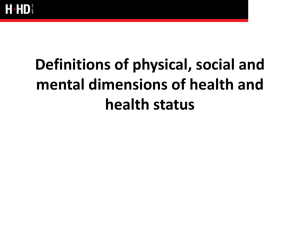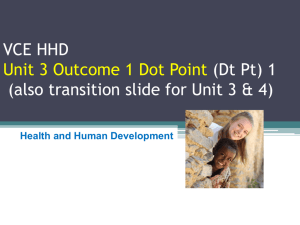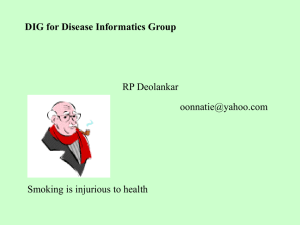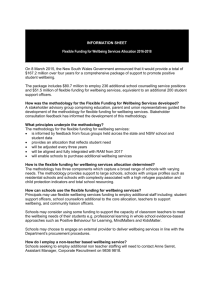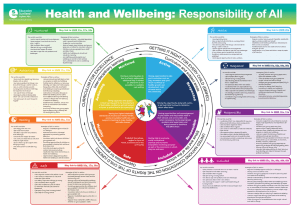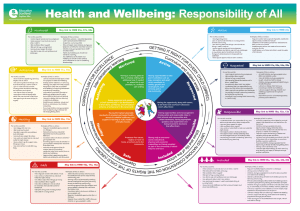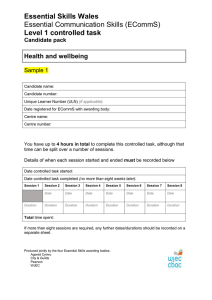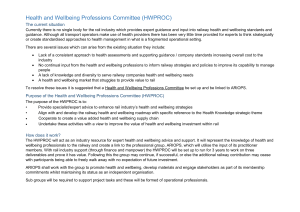Health and Human Development UNIT 1 Ms Mena
advertisement
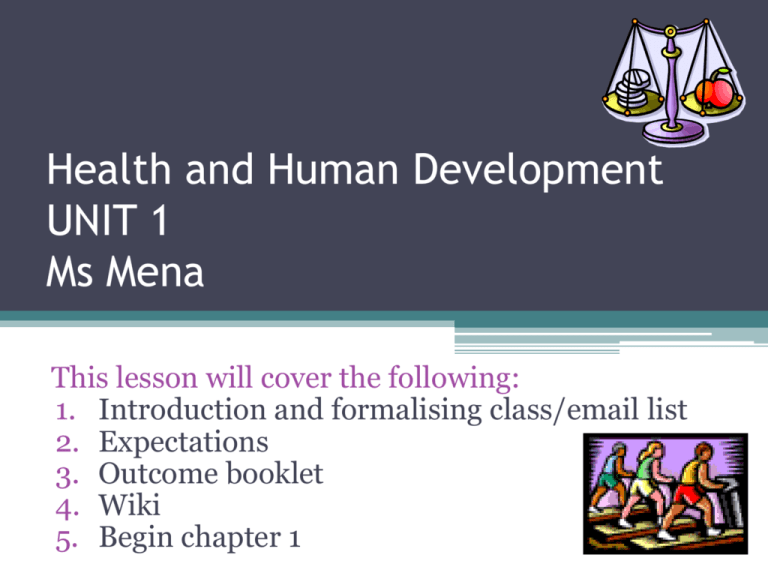
Health and Human Development UNIT 1 Ms Mena This lesson will cover the following: 1. Introduction and formalising class/email list 2. Expectations 3. Outcome booklet 4. Wiki 5. Begin chapter 1 Welcome! Class expectations: 1. All students are required to follow the agreed College Code of Conduct. 2. Textbook: Cambridge VCE Health and Human development Units 1 & 2; and folder for handouts. 3. Semester 1 = Unit 1 (Consists of 3 AOS’s) Semester 2 = Unit 2 (Consists of 3 AOS’s) 4. Students are required to use the wiki for this subject: http://wrschealthandhumandevelopment2011.wikispaces.co m/ Overview of Units 1-4 HHD (Year 11 & 12) • The VCE Health and Human Development study approaches the concept of ‘development’ as a continuum, that begins with individual human development in Units 1 and 2 and progresses towards human development at a societal level in Unit 4. • In Units 1 and 2 the study of human development is about individual change, that is a continuous lifelong process that begins at conception and continues until death. Individual human developmental changes are cumulative; development that occurs in the future is dependent upon development occurring in the past. UNIT 1 - The health and development of Australia’s youth See Outcome Booklet • Area of Study 1: Understanding health and development Outcome 1 = Song or film review with written report (30 marks) • Area of Study 2: Youth health and development Outcome 2 = Data analysis (35 marks) • Area of Study 3: Health issues for Australia’s youth Outcome 3 = Multimedia presentation (35 marks) You must satisfactorily complete each outcome to pass the Unit. Chapter 1: Introducing health and human development • Objectives: ▫ 1. Defining health and its limitations ▫ 2. The dimensions of health and their interrelationships Task: GKR - What is meant by the term “health”? In pairs, draw a picture of a healthy person, and discuss as a class what your definition of health is. Defining health • Health as defined by the World Health Organisation (WHO) 1946: “A state of complete physical, emotional and social wellbeing and not merely the absence of disease or infirmity” • Wellbeing is the state of being healthy, happy and contented, usually determined through self assessment. Ottawa Charter definition of health This definition builds on the WHO definition and identifies eight prerequisites for health: – peace – shelter – education – food – income – stable ecosystem – sustainable resources – social justice and equity • Health is a form of homeostasis; which is the property within a living organism that regulates its internal and external environment to maintain stability and constancy. • Health and wellbeing are active states. This is a term used to describe health because is it greatly affected by factors such as lifestyle and behaviour choices, food and nutrition and environmental influences. • Clip - Homer Simpson goes to the gym: http://www.youtube.com/watch?v=R4i8Sp NgzA4 Limitations of health definitions • There is debate about the accuracy of the definition of health as it is rare for somebody to be completely healthy as described by the WHO, it is also possible for a person to be free of disease, but not healthy. • Most Australian information about health relates to mortality (rates of deaths) or morbidity (rates of disease). The dimensions of health and their interrelationships • There are three dimensions of overall health: ▫ 1. PHYSICAL HEALTH Relates to the efficient functioning of the body and its systems, and includes the physical capacity to perform tasks and physical fitness. ▫ Resistance to disease ▫ Energy, strength and coordination ▫ Ability to recover from illness and injury ▫ Ability to maintain a healthy weight ▫ Fitness ▫ Nutritional status ▫ 2. SOCIAL HEALTH Being able to interact with others and participate in the community in both an independent and cooperative way. ▫ Develop and maintain relationships ▫ Communicate with others ▫ Behave appropriately ▫ Contribute to community ▫ Access and use support systems and resources ▫ 3. MENTAL HEALTH State of wellbeing in which the individual realises his or her own abilities, can cope with the normal stresses of life, can work productively, and is able to make a contribution to his or her community. ▫ Express emotions ▫ Positive self-esteem and self-confidence ▫ Cope with and manage stress ▫ Capacity to love, work and play Complete Act 1.2, Qs 1&2 (pg 6). TASKS: 1. Health Quiz a) Complete the quiz given for either yourself or someone you know, and then categorise the statements as being with physical, social or mental. (Write P, S or M next to each question) b) From the quiz, can you identify one aspect of health that could be improved? c) What process could you use to bring about this improvement or change? d) How would you know if the change was successful? e) How would this change improve health? Explain. 2. Case study • Read the case study you have been given and underline or highlight the key terms and ideas. • Fill in the table by identifying the examples from the case study to show the interrelationship between the different dimensions of health.
